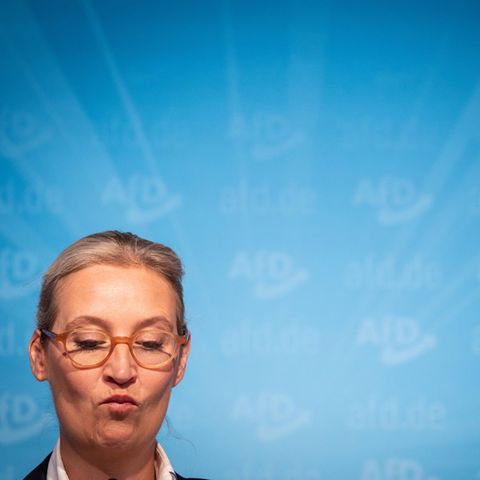Column: very close east
The East last
Copy the current link
Add to the memorial list
What remained of the GDR and the People’s Chamber – or: Why the East Germans at least chose their own representation deficit.
Of course, I could now tell what it was like when I was sitting on March 18, 2025 on the third floor of the Reichstag building, under the huge glass dome, which was called by the spring sun. I could report on how I watched the deputy of the old, 20th German Bundestag how they went into their faction halls to prepare for the votes on the trillion -difficult debt package.
And I could complain about what needs to be complained. That the CDU and CSU committed smooth word fracture with their one-Billion debt decision. That a de facto parliament is changing the Basic Law. And that this behavior, especially the trust of East German people in the political institutions, also destabilizes.
The GDR and I celebrated together
But no, I prefer to write about what I did on March 18, 1990. It was my first choice of parliament. And because happiness had also considered me in terms of birth, the coordination was free, equal and secret. The GDR and I celebrated together.
The polling station was in the village school, which I went to a few years earlier and which would close in a few years. But nobody could have guessed that.
Since I have already revealed my electoral secret several times, I hereby share again that I chose the Alliance 90 for the election of the People’s Chamber-the united civil rights activists who had dominated the tables and occupied Stasi quarters just a few weeks earlier, and that despite my voice, officially shrank.
The SPD, which had only been founded in October 1989 as an SDP, did not receive as many voices as predicted. She ended up in second place. Instead, the CDU, that is, the party that had been served as an instrument of power until autumn 1989 the SED in the national front.
The block party had teamed up with the new foundation DSU, which was made like a particularly right CSU, and adorned itself with the civil rights -like “democratic departure”. The short-lived “Alliance for Germany” promised everything most people wanted: freedom, security, prosperity, unity and of course the D-Mark. And all very, very quickly. Real-existing VEB socialism would need five years to bloom newly capitalistically. At most.
The voters were not disturbed by the fact that a large part of the CDU candidates were so-called recorders and even some of them were suspected of Stasi. And they didn’t care that the election campaign was paid by the West CDU and controlled by Bonn. People absolutely want to believe the populism of the turning hales of the union of the reversible union – and in no way hear something of impending dein industrialization, mass unemployment and other transformation pain.
Very close east
star-Autor Martin Debes reports primarily from the five eastern federal states. In his column, the native Thuringian writes what is going on in the very Middle East – and in himself
The first and last free GDR people’s chamber election is now exactly 35 years. If you look at things from today, a lot of East Germans already chose a party that told them that they would get western values plus prosperity in vain, and on top of it. As a result, the so-called accession area with the subsequent state and federal elections almost continuously became black- whereby the SED mutated to the PDS also came to double-digit results, which it would significantly expand in the following years.
Seen in this way, East German election behavior has remained constant. Many of the people who long believed in the CDU their promise or whip their protests at the PDS are now voted for AfD and BSW. These two parties also promise absolute freedom, prosperity for everyone and world peace.
In addition, and that is the decisive difference, they also live from what was received or inherited from the GDR: authoritarianism, anti -Americanism and the habit not to get involved. Incidentally, the AfD takes the entire extreme potential for non-voters or earlier NPD and DVU supporters, which has always been about twice as high in the east as in the west.
When Alexander Gauland still felt at home in the CDU
However, this does not mean that the Union from back then, even if Alexander Gauland still felt in her comfortable, is the AfD of today. Despite all the errors and mistakes, the west CDU beyond its-always priority-interests were committed to the fact that the East did not lose the connection. Despite all the disappointments, humiliations and disadvantages, the East Germans benefited from their election behavior.
And yes, even the successes of the PDS came to the benefit of East Germans. They equipped the CDU or SPD Prime Minister of Saxony, Brandenburg or Saxony-Anhalt with the necessary pressure to negotiate a second solidarity pact and to receive support programs. So the protest paid off, and this in the word sense.
In the meantime, there was even something to do with the East German representative deficit. The fact that a Chancellor, which was socialized in the GDR in addition to a reversing Federal President, did not change the structural imbalance little. But it strengthened the fragile self -esteem in the east.
All of this is different now. In East Germany, the AfD is a party of the Hegemon that does not stand for the state -bearing center, but for the distant border. The consequences are only negative, for the investments, for the immigration of specialists – and for political representation. The east comes last.
It still has to do with the deplorable ignorance of the West German dominated parties that discarded few East Germans are participating in the coalition negotiations or even trading for management items, which is why East German topics are hardly taken into account. But this time it is also due to the fact that most of the East German members of the Bundestag no longer sit in the CDU and the SPD – but in the AfD.
And so even I, who in this column often and likes to vote in the traditional lamentation of the Newfish, has to admit exceptionally: to blame.
You can find all Martin Debes columns published so far .
Source: Stern
I have been working in the news industry for over 6 years, first as a reporter and now as an editor. I have covered politics extensively, and my work has appeared in major newspapers and online news outlets around the world. In addition to my writing, I also contribute regularly to 24 Hours World.





